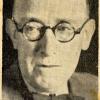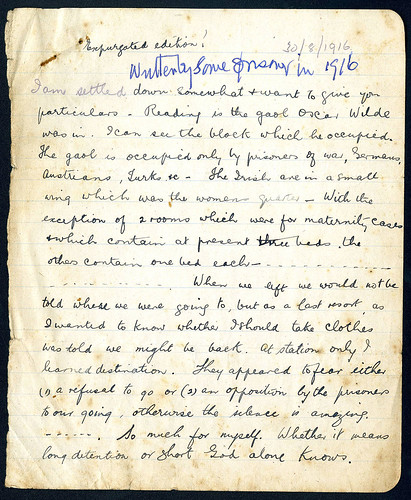Irish Theatre Archive: John MacDonagh Collection
Published on 2nd February 2016
 The Decade of Centenaries has brought with it many opportunities for mature reflection on the Irish state’s legacy of the past hundred years. Accompanying this has been a renewed interest and analysis of the character and contribution of the leaders and their near mythical status as exemplars of the Irish revolutionary spirit. The broadly civic and inclusive nature of the commemorations has also brought to light the stories of many of those involved in 1916, which have heretofore been consigned to the footnotes of history books, or to family photo albums and fireside reminiscence. It is only right and proper that the contributions of the many great women of 1916, for example, or the roles of rank-and-file rebels, or the tragedies of the ordinary civilians whose lives were cruelly cut short, are receiving the attention they deserve.
The Decade of Centenaries has brought with it many opportunities for mature reflection on the Irish state’s legacy of the past hundred years. Accompanying this has been a renewed interest and analysis of the character and contribution of the leaders and their near mythical status as exemplars of the Irish revolutionary spirit. The broadly civic and inclusive nature of the commemorations has also brought to light the stories of many of those involved in 1916, which have heretofore been consigned to the footnotes of history books, or to family photo albums and fireside reminiscence. It is only right and proper that the contributions of the many great women of 1916, for example, or the roles of rank-and-file rebels, or the tragedies of the ordinary civilians whose lives were cruelly cut short, are receiving the attention they deserve.
John MacDonagh, in my opinion, falls between two stools. While a junior officer with the Volunteers during the Rising, he was not a leading figure. However, his relationship to Thomas MacDonagh, as well as his subsequent success as a dramatist, film director, writer, poet, singer and musical composer, mean that he offers the student of 1916 neither the ‘everyman’ quality that appeals to human interest, nor the opportunity for great historical revelations. It is for just this reason however, that John MacDonagh’s papers deserve attention.
Life and Legacy
John MacDonagh was born in 1880 in Cloughjordan, County Tipperary. He trained as a professional singer in Italy and began his working life in the theatre touring with the Moody-Manners Opera Company, performing in various grand opera productions in England and the United States. Upon returning to Ireland he became actor-producer with the Irish Theatre Company, founded in 1914 by Edward Martyn, his brother Thomas MacDonagh and Joseph Plunkett. Here, he introduced Irish theatre for the first time to plays by masters of drama such as Tchekoff, Ibsen, Strindberg and Maeterlinck.
During the 1916 Easter Rising John MacDonagh served as a Lieutenant with the Irish Volunteers, stationed at the Jacob’s Biscuit Factory on Bishop Street, Dublin, alongside his brother Thomas, who was Commandant of the 2nd Battalion of the Irish Volunteers. Following the surrender of the rebels Thomas was sentenced to death by firing squad and John was sentenced to life imprisonment. He was initially incarcerated at Knutsford Jail, Cheshire, England, before being moved to the Frongoch internment camp in Merionethshire, Wales.
MacDonagh was released in August 1916 and returned to Ireland. He joined the newly established Film Company of Ireland, working alongside its main director and Abbey actor Joseph Michael Kerrigan. He directed several films, as well producing several of his own plays, having particular success with his 1921 work 'The Irish Jew'.
In 1924 he established his new revue show called 'Dublin Tonight' (revue being a very popular entertainment genre at the time), garnering much public acclaim. His short plays, sketches and songs were also contemporaneous favourites on Irish radio.
In 1937 he was appointed Productions Manager of Radio Éireann, a newly introduced post, which he held until 1947.
John Mac Donagh died on 1 July 1961, at the Meath Hospital, and is buried at Dean’s Grange Cemetery, Dublin.
The Collection
The John MacDonagh Collection consists of material gathered and assembled primarily by John MacDonagh himself, and spans the many facets of his diverse career. A small amount of material contained in his scrap book, including newspaper notices of his death and funeral arrangements, was added subsequently by person or persons unidentified. The majority of the material relates to the world of arts, culture and entertainment.
A large amount of the collection consists of MacDonagh’s plays and comedic sketches - multiple copies in many cases - in complete, partial, draft, and annotated forms, providing the researcher with an insight into MacDonagh’s creative processes and idiosyncrasies. The collection also contains two volumes of sheet music related to musical theatre productions by MacDonagh, correspondence relating to the licensing, publication and promotion MacDonagh’s songs, mainly “Did Santa Claus come from Ireland?", and a selection of ghost stories written by members of the public, submitted to MacDonagh as part of a competition while he was the Productions Manager at Radio Éireann. The collection also contains a small amount of material related to MacDonagh’s republican credentials, most notably an eight page, hand-written letter dated 30 August 1916, to the London Aid Committee, describing conditions for Irish prisoners-of war in the Frongoch internment camp and signed simply “Henry”.
While his role in the Rising might have been overshadowed by that of his brother, John MacDonagh’s role in shaping the artistic and cultural life of post-independence Ireland makes his story as worthy to tell as any other, and his name as important to remember.
Daniel Ayiotis, Dublin City Archives Intern, January 2016
